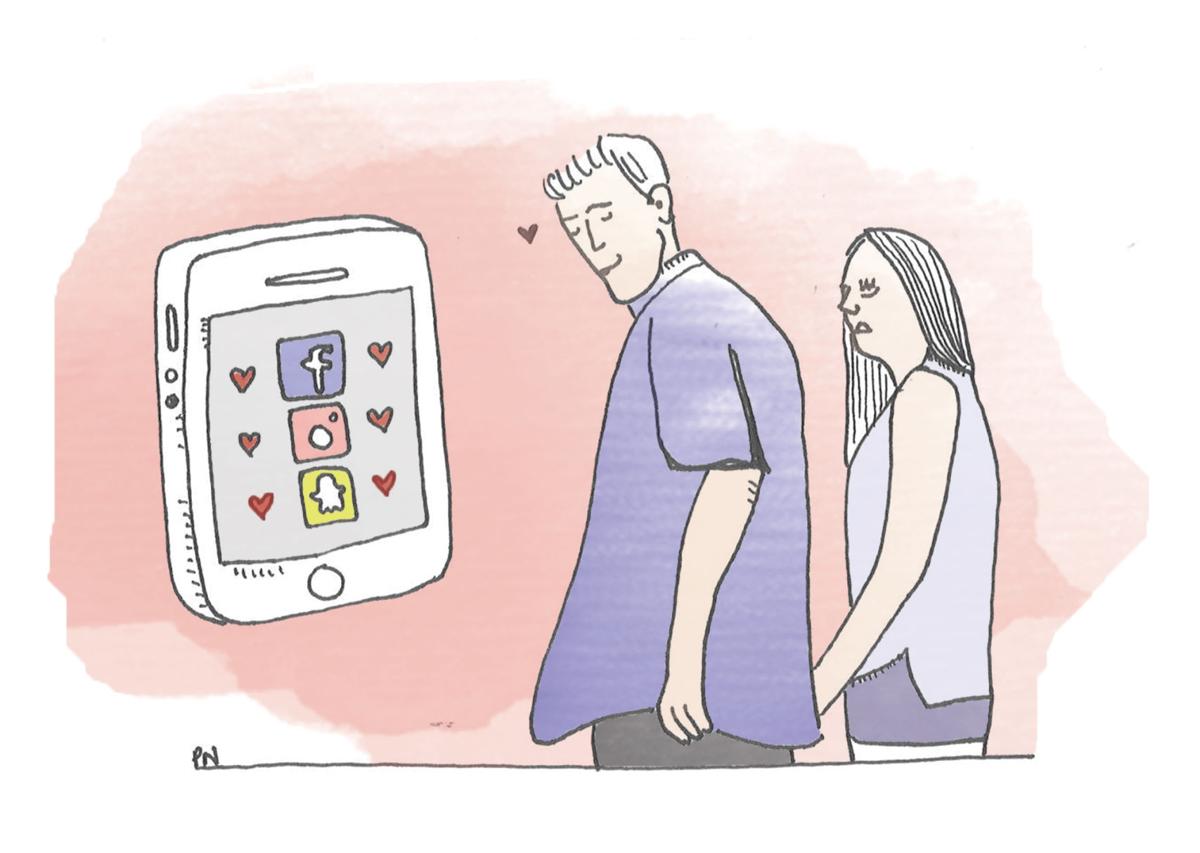Micro-cheating, social media jealousy can cause distrust in relationships

Recently, the internet has been saturated with a new advent of internet culture known as micro-cheating—a type of emotional infidelity that doesn’t include exchanging any fluids, but involves subtle behaviors on social media that may hint one is not fully committed to his or her current relationship. The consensus on whether such a concept should be taken seriously is mixed, with some providing helpful hints on how toavoid accidentally micro-cheating, and others saying accusing a partner of cheating based on innocuous social media behavior is a symptom of possessiveness and abuse (the latter is probably correct). Regardless, the issue points to a more wide-ranging issue: Maintaining trusting relationships has become much more difficult with the prevalence of social media.
Anyone with a social media presence is probably guilty of “stalking” friends, acquaintances and partners from time to time. While this behavior in and of itself is not necessarily a problem—social media does exist for a reason—constantly combing through one’s partner’s Facebook feed can lead to feelings of jealousy and suspicion with every post. Increased usage of sites like Facebook or Snapchat are associated with higher levels of jealousy, especially regarding activities involving one’s partner. A like on a photo turns into flirting, snapping a friend equates to cheating, and every photo involving someone of their preferred sex other than one’s partner is competition.
This type of obsessive checking of a significant other’s social platforms feeds distrust, especially considering the lack of context generally provided with a post on Instagram or Twitter. These feelings can easily grow to become more than subconscious worries. They can evolve into possessive and destructive behaviors, such as checking a partner’s device without permission, something 34 percent of women and 62 percent of men admit to doing. Even if one’s partner is unaware of these actions, perusing his or her personal devices in secrecy may be indicative of troubling levels of insecurity and a need for dominance in the relationship.
Social media does more than foster suspicion between partners, but can also be used to falsely advertise a failing relationship as happy and successful. We’ve all seen posts from a friend gushing over his or her boyfriend or girlfriend. While some might find this distasteful, others wonder why their partners don’t seem to care for them the way their friends’ significant other does in a love-dovey Instagram post. The problem is that posts never show what’s actually going on behind the screen. According to relationship expert Dr. Nikki Goldstein, people who constantly post photos of themselves and their significant other are often unhappy and searching for validation of their relationship from friends, rather than the relationship itself. Such relationships, while probably on their last leg, are kept on life support through the use of frequent “I love you” posts, leading to possessive partners and unhealthy breakups.
This doesn’t stop those of us who don’t post about our partner from incessantly feeling slighted and unappreciated. Even if a relationship is going well, it’s hard not to feel like maybe it doesn’t matter to a partner if they don’t post about it on a regular basis. This overanalysis can make it hard to recognize that in a relationship, one member will usually be more private than the other, and thus less likely to post moments of their lives on the internet.
Of course, just because couples use social media doesn’t mean it is ruining or even hurting their relationship. A Pew Research Center survey reported that social media had a major impact on 45 percent of 18 to 29 year olds’ relationships. Of those surveyed, 74 percent said the impact was mostly positive. Social media is a great way to keep up with a partner’s life when apart, to let friends in on a fun day out, or to announce various stages of a relationship, like getting engaged or having a child. Sharing details of one’s life with a significant other doesn’t necessarily signal a possessive or obsessive relationship, nor does it signify the end. Oftentimes, a picture of a happy couple on Facebook really is just that.
The important thing to remember when considering a relationship and its place on social media is that Facebook, Twitter, Instagram and Snapchat are not accurate representations of real life. People shouldn’t feel like the photogenic couple on Facebook is happier than them, because that’s exactly what they want people to feel. If someone’s partner isn’t posting about them, it doesn’t mean they don’t like them. If someone’s partner is liking images of or having conversations with people of the opposite sex, it doesn’t mean they are “micro-cheating.” They’re probably just interacting with others on social media.
Social media is all about appearances. Letting oneself focus on his or her relationship without letting social media influence how one views his or her love life or trusts his or her partner will allow one to evaluate his or her own feelings. There is no need to compare them to an unrealistic portrayal of everyone else’s lives.
Comments
Post a Comment